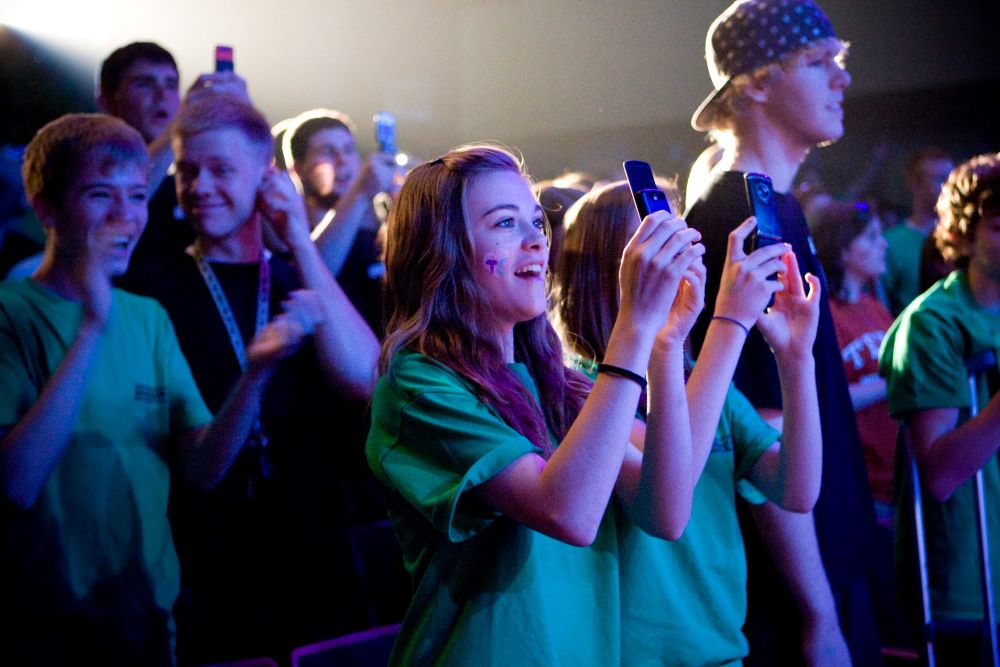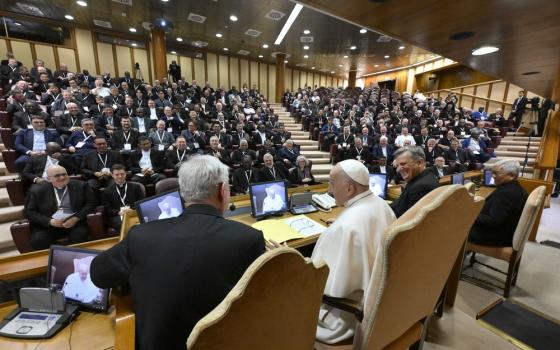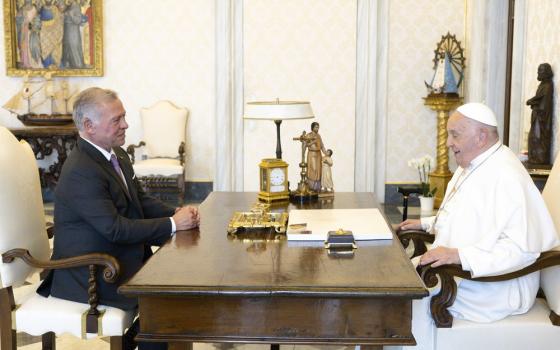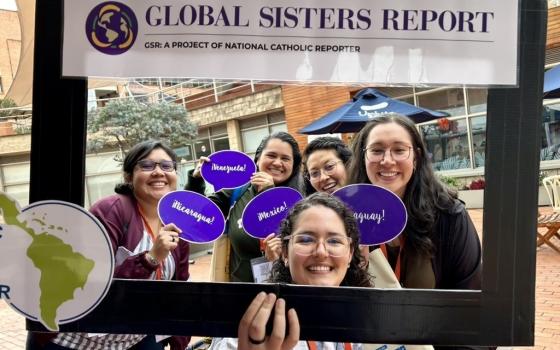
Students cheer and take photos with cellphones as singer Taylor Swift performs at Bishop Ireton High School in Alexandria, Va., April 28, 2009. (CNS/Jonathan Tramontana)
Nearly three of every five teenage girls in the U.S. experience persistent sadness or hopelessness, according to a report released by the Centers for Disease Control and Prevention earlier this year. More than 30% seriously considered attempting suicide. These are shocking, disturbing numbers — ones that should provoke a sense of crisis that reflects the gravity of the situation, serious thought about a better way forward and real action to remedy the underlying causes of the crisis.
The isolation of the pandemic certainly made matters worse, but these trends stretch back over a decade, as rates of depression, anxiety, sadness and self-harm have all risen dramatically. The timing of this surge — beginning in the early 2010s — has led many to identify smartphones and social media as the primary culprits.
While it seems highly unlikely that just one factor is behind this dramatic increase, it is difficult to deny the harmful nature of social media to millions of teenage girls. If you ask teenage girls themselves, many will identify social media as a major problem.
In the ninth-grade U.S. government course I teach, my students (all girls) could choose from a number of topics for a video project about current legislation. A solid majority of the groups made videos advocating for greater regulation of social media. They know the harm it causes.
So why don't they just quit? They stay for the parts of social media they enjoy, like connecting with their good friends or seeing funny videos, or because of external pressures to conform.
But they also know how easily social media fosters insecurity, envy, the fear of missing out, anxiety about social status and more. They know how scrolling TikTok can steal precious hours of necessary sleep. They worry about the effects of repeatedly seeing terrifying images of police brutality and school shootings. Many know that algorithms prime them to absorb toxic notions of attractiveness, to believe that purchasing more consumer goods will bring them happiness, and to seek validation with likes, comments and shares.
The starting point must be rejecting extreme individualism and committing to the common good and solidarity — and teaching our kids to do the same.
Yet knowing this does not exempt them from these algorithms' influence, particularly for teenagers trying to work out their identities and sense of self. They are acutely sensitive to social cues and pressures, even when they are aware of the threat these pose to their flourishing. We greatly overestimate our ability to control technology, often underestimating its impact on the subconscious level. Teaching teenagers better practices on social media can reduce harm (and my school does this), but many will inevitably find social media more harmful than beneficial.
And this is before we get to the issue of social media-based bullying. Bullying is nothing new, of course. But now there is no respite for some kids, as there once was in the safety of their homes. At midnight or first thing in the morning, a teenager might receive a notification and open an app to see they are being mercilessly bullied, mocked about their deep insecurities or social status. It is not hard to imagine the anxiety and dread that permeates these kids' lives.
Digital connections are also replacing many face-to-face connections, and it is very clear that this is not a one-for-one trade. Spending time in person with friends is extremely valuable for the emotional health of teenagers, and as screen time replaces more of this hangout time, we should expect it to have a negative impact on many teens.
Social media also contributes to a mindset that sees catastrophe everywhere. Anger and outrage are rewarded by algorithms, and kids are habituated to adopt this behavior for recognition and popularity. Even those who use social media more passively have probably experienced doomscrolling — looking at a seemingly endless string of posts about tragedies, disasters and crises.
A sense of doom
So what is causing anxiety or this sense of doom: social media or the state of the country and the world? Probably both. We face real crises, including mass shootings, climate change and democratic backsliding. Racial inequality persists, rates of sexual violence are appallingly high and our immigration system remains broken. Our dysfunctional political system seems ill-equipped to remedy any of this.
Members of Generation Z have grown up in the wake of the Great Recession, botched, half-hearted wars and a sexual abuse crisis in the church. They have witnessed an attack on the U.S. Capitol, fueled by a corrupt president with little to no commitment to democracy or the country’s highest ideals. It is a deeply pessimistic generation, and it's easy to see why.
These experiences have undermined faith in nearly every institution, including the government, organized religion and the family. Economic, political and religious leaders are often seen as more interested in their own power or prestige than in trying to serve the common good. It is not uncommon to hear young people say that it is unethical to bring a child into such a broken world.
At the same time, social media is intensifying this pessimism and creating a distorted, one-dimensional picture. We face major challenges as a country and world, but there are also developments that should inspire hope. Yet the heroic actions of everyday Americans who help their families and communities flourish too often do not make it into people's feeds. Doom and gloom prevail, and it is not an accurate portrait of the country or the world.
There are also indications that social media makes kids less resilient. A recent study found that the younger a person owns a smartphone, the lower their self-worth, motivation and resilience will be as they grow older. And teenage girls are not the only ones suffering. In the U.S. we also face a dramatic rise in deaths of despair — from suicide, alcohol and other drugs, notably opioids.
There appears to be a growing sense of precarity. As the middle class narrows, social mobility remains stalled and inflation hits hard, a standard middle class life is increasingly seen as unrealizable. And all this has been made worse by the isolation so many feel as our society becomes more individualistic.
This sense of precarity is affecting teenagers as well. Increasingly the country seems divided between the winners and the losers. This is fueled by a rampant meritocratic ideology that perpetuates injustice and props up a false meritocracy.
Many teenagers from affluent backgrounds feel intense pressure to build an exceptional resume to get into the most exclusive colleges, and rates of anxiety and depression are exceedingly high for this group. Those not on the path to college, meanwhile, often do not see a future life of respect and dignity. Many working class people feel that highly educated elites respect neither the dignity of their work, nor their innate dignity as a person.
A sense of connection, purpose and meaning is disappearing for far too many Americans, as shared norms, strong communities, in-person relationships and a sense of transcendent meaning are all in retreat. Modern freedom gives us the chance to have a greater say in charting our own path, but without a shared good that we are pursuing, it is bound to end in frustration, isolation or simply nihilism. Attempts to invent meaning from scratch are inevitably seen for what they are — arbitrary, capricious and devoid of actual meaning.
Candi Daniels, a junior at Andrean High School, Merrillville Indiana., tries to reach her parents after school before cheering at a basketball game in this Feb. 24, 2006, file photo. (CNS/Karen Callaway)
A revolution in solidarity
What is required is no less than a revitalization of meaning and community in American life. We need a revolution in solidarity, the sense that we are all in this together. And Catholics in the United States should be leading this revolution.
We need to fix our broken institutions, including our democracy, take on the big challenges of climate change, gun violence and racial injustice; rebuild and expand the middle class while providing a real social safety net for all Americans; foster a more widespread sense of respect for working class people we too briefly called "essential workers" by restoring the dignity of work and increasing participation; rebuild our intermediary institutions and local communities; and overcome the threat social media poses to our democracy and our kids.
Catholic social teaching provides the framework to address many of these issues. Pope Francis' encyclical Laudato Si has properly framed the challenge of climate change, as he has called us to hear both "the cry of the earth and the cry of the poor." It is hard to overstate how heavily this issue weighs on young people. The church's message of hope and call for action can help reduce the sense of helplessness and doom. In our own homes, parishes and communities, we can take concrete steps to reduce our carbon footprint and better protect God's creation, all while calling on our government to address systemic reform.
The personalist philosophy behind Catholic social teaching recognizes that people cannot fully flourish without having their material needs met. The church teaches that the right to our basic needs is a human right, and one of the basic functions of a just government is to secure our human rights. Catholics must transcend our polarized politics and embrace Catholic teaching on this matter.
Pope Francis has also emphasized the dignity of work and respect for dignified work, which can challenge both the depersonalizing snobbery of meritocratic ideology and the widespread fixation on maximizing profits at the cost of the common good. All Catholics are called to embrace their church's teachings and reject the "libertarian invasion" Pope Francis has denounced.
Advertisement
Fixing institutions begins by fixing our Catholic institutions. Pope Francis' synodal approach may be the first step. It is certainly true that we need more bishops who follow in Pope Francis' footsteps rather than acting as ideologues and defenders of conspiracy theorists, but trust cannot be built entirely from the top down.
We need to revitalize participation, community and trust in our local parishes. Too often, young Catholics attend Mass, no one speaks to them, they go home and that is their entire experience of the church. We cannot be surprised by how many feel alienated and disconnected. We need to create cultures of welcoming and belonging. We need to create authentic communities.
Fixing our democratic institutions relies even more heavily on expanding participation. Economic elites dominate both parties. Special interest groups have disproportionate influence. We need political reform to reduce the influence of money and make elected officials more accountable and responsive. We also need to reestablish democratic norms that have collapsed in recent years.
As democracies around the world struggle to avoid democratic backsliding, the church can send a clear message that people have a right to participate in their government and that we must create conditions that foster authentic participation for the sake of human dignity and genuine freedom.
None of this will be easy. And U.S. Catholics cannot do it alone. But the starting point must be rejecting extreme individualism and committing to the common good and solidarity — and teaching our kids to do the same.
It begins in our families. Catholics must necessarily be countercultural. If we want our kids to see that a life animated by love brings meaning and purpose, fosters joy and is worth pursuing, even in a sometimes hostile culture, we need to show this through our own daily witness. We need to reject superficiality and selfishness for authenticity and concern for others. And we need to explain why a radical commitment to Gospel values offers a far richer life than the alternatives in our ambient culture.
In what we say and do, teenagers need to be taught to root their identity, not in what they buy or accomplish or how others see them, but in who they are as a person — their character and irreducible core. This is the foundation of a life with real meaning. If smartphones and social media are undermining this, parents must delay allowing their children to have these and closely monitor them when they get them, even if others in their social circles refuse to do so.
If teenagers' peers are caught up in the meritocratic struggle for prestige and status, parents must teach the truth that how we serve others is what actually counts in life. We have seen the empty promises of libertarianism and the false idol of maximizing individual autonomy — it leads to increased despair and death. It is time to resist.











